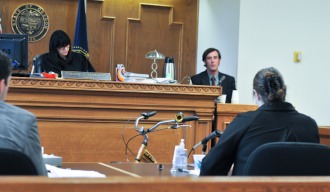
(Photo © J. Maus/BikePortland)
The State of Oregon has issued a judgment of “not guilty” in the trial of the “Disco Trike” and its owner, local activist and filmmaker Dan Kaufman. The trial was heard by Multnomah County District Court Judge Cheryl Albrecht last Friday and she announced her decision today (PDF).
The Portland Police Bureau arrested Kaufman and seized his video equipment and his adult tricycle on SW Main Street near the Elk statue on the evening January 25th, 2012. Kaufman was participating in the J25 Occupy protests to commemorate the one-year anniversary of the Egyptian uprisings in Tahrir Square. According to court documents, Kaufman was in custody for 40 minutes and his personal property was impounded (it was released to him one month later). Ultimately, he received a violation for Unlawful Operation of Sound Producing Equipment. The police testified in court last Friday that the amplified music being played from his Disco Trike was agitating the crowd and that it could be heard beyond the legal distance of 100 feet.
Kate Stebbins represented Kaufman in the trial. She argued that the police impinged on her client’s constitutional right of free expression and that the state could not prove beyond a reasonable doubt that the trike was 1) causing the crowd to become more aggressive and 2) that it could be heard beyond 100 feet. Stebbins also said that Kaufman was given conflicting instructions from the police about where he was allowed to ride and walk with his trike during the protest march.
In his testimony during the trial, Sgt. Craig Dobson of the PPB said he warned Kaufman repeatedly to turn down his music. Dobson said he was concerned with the noise because of nearby residential housing and Kaufman’s lack of a permit. Dobson also testified that he believes the music “adds to the commotion” of the protest. “Any time we have loud rhythmic sounds it effects crowds,” he told Stebbins during cross-examination, “and it makes it hard for us to be able to keep control of the situation.”
Sgt. Dobson also told the court that it is his belief that loud, amplified music makes protestors more disruptive and violent. The lawyer representing the State of Oregon in the case, said that the music was so loud that “It was inciting incidents of violence and vandalism, or juicing up the crowd to act in a more aggressive manner.”
Stebbins maintained that Dobson’s intent in seizing the Disco Trike was not because it was too loud, but because of the effect the music had on the crowd. In that case she argued, the State over-stepped its authority.
During his testimony, Kaufman said he feels his music has more of a calming effect on the crowd (for what it’s worth, he was playing Bob Marley when he was arrested). Kaufman testified that during prior protests, police officers actually requested that he played mellow reggae songs like Buffalo Soldier. “I felt I could use the power of the Disco Trike, as I have in the past,” said Kaufman on the stand, “to redirect the crowd from focusing our energy into the wrong place. I turned up the Bob Markley specifically because I felt it would help relieve the tension… which I think it did.”

In his closing argument, the lawyer for the State maintained that the police had the right to issue the violation because 1) the music was making the officer’s jobs of controlling the crowd more difficult and 2) because it was “too loud for the neighborhood.” Speaking about the police officers’ actions, the lawyer said, “… They could have come in and cracked skulls if they wanted to quell speech… but they didn’t do that.”
In her closing argument, Stebbins said the state did not have any evidence that the music was too loud and that, in order to confiscate Kaufman’s property, “It has to be specific harm the officers are trying to prevent.” “Sgt. Dobson was very clear,” she continued, “he had Dan Kaufman arrested specifically for the effect he was having on the crowd.”
In her decision, Judge Albrecht said that, “An officer can have concurrent motives,” but that, “the ordinance at issue addresses the harm of noise in the community, not safety issues.”
Put another way, Stebbins felts like the police couldn’t have it both ways. Either they charge Kaufman for a noise violation they couldn’t prove, or they violated his right to free speech. In the end, the Judge agreed with her.
Here’s more from Albrecht’s conclusion:
“Moreover, restraining expression because of the expression’s effect on others goes directly to its content, and expression is protected even if it is provocative, creates a tense atmosphere with the potential for violence or is likely to provoke a disorderly response.
The issue then is, in light of all of the evidence, what is the greater motive. It is the state’s burden to establish beyond a reasonable doubt that the particular enforcement of the regulation was aimed at the harm targeted by the ordinance and did not have as its motive the restriction of expression. In this case, based on the video evidence and testimony outlined above, the court has a reasonable doubt that the motive to enforce Portland City Ordinance 14A.30.020 against Mr. Kaufman was for its stated purpose. As such the court enters a finding of not guilty and enters a judgment of acquittal as to Mr. Kaufman.”
Kaufman is very happy about the ruling and says he’s planning a victory ride tomorrow. Meet at the Vera Katz statue on the Eastbank Esplanade and roll out at 5:30. More details here.
— Download a PDF of the judgment.

